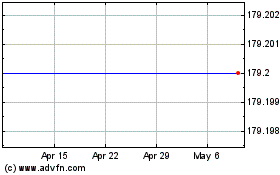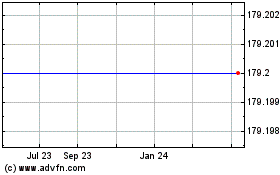By Preetika Rana and Peter Landers
This article is being republished as part of our daily
reproduction of WSJ.com articles that also appeared in the U.S.
print edition of The Wall Street Journal (April 26, 2018).
Takeda Pharmaceutical Co. is near a deal worth more than $60
billion to buy European drugmaker Shire PLC, having raised its bid
four times in a sign of how ardently Japan's legacy companies are
chasing growth abroad as sales at home slow.
Shire said Wednesday it would recommend shareholders accept
Takeda's fifth offer -- $30.33 in cash and 0.839 Takeda share for
each Shire share -- culminating a weekslong effort by the
Osaka-based company. It has until May 8 to complete a deal.
The acquisition would be the biggest to date by a Japanese
company of a Western one, according to Dealogic, and create the
world's eighth-largest drugmaker by sales. Buying the Dublin-based
maker of rare treatments would help Takeda pivot away from its home
base -- where the government recently began implementing more
stringent drug-pricing controls -- to more lucrative markets such
as the U.S. and Europe.
The prospect of taking on significant debt to fund the deal has
sent Takeda's stock price into a tailspin since it expressed
interest in Shire, whose market value now exceeds its own by about
$15 billion. Takeda's shares closed down 7% Wednesday, eating into
the value of the stock portion of its offer and bringing the total
decline since late March, when it first said it was courting Shire,
to more than 18%.
Credit-ratings company Moody's said Wednesday the deal could
invite "a multinotch downgrade" from its current single-A
rating.
"You would be nervous, scared even, if you are a shareholder in
Takeda," said Fumiyoshi Sakai, a Credit Suisse pharmaceutical
analyst in Tokyo. "But if not this, and not now, then what does
Takeda do?"
Takeda's pursuit of Shire is emblematic of a trend: Japan's
behemoths, seeing little potential at home owing to a shrinking
population or unfavorable regulation, are looking for growth
overseas.
SoftBank Group Corp. has transformed itself from a Japanese
mobile-network operator into a global investment fund. Its deal for
U.K. chip designer ARM Holdings PLC in 2016, valued at roughly $32
billion at the time, is the current record holder for Japanese
overseas acquisitions. In 2012 it struck a deal to buy control of
Sprint Corp. of the U.S. for $21.6 billion.
Other Japanese companies, while keeping the bulk of their
business at home, have sought to diversify. Several insurers have
made multibillion-dollar acquisitions in the U.S., led by Tokio
Marine Holdings Inc.'s $7.5 billion purchase of HCC Insurance
Holdings in 2015. Motor maker Nidec Corp. said Tuesday it would pay
$1.08 billion for a Whirlpool Corp. unit that makes compressors for
refrigerators.
The Takeda-Shire deal would lift the value of this year's
outbound mergers and acquisitions activity by Japanese companies to
roughly $100 billion, according to Dealogic -- easily on track to
top the full-year record of $111 billion, set in 2012.
Japanese pharmaceutical companies have an additional reason to
search for acquisitions: Like their Western counterparts, they are
looking at drying pipelines, and need a quick way to replenish
shrinking portfolios of patent-protected drugs.
The pain is compounded by government policy. The Japanese
government -- confronted with a large aging population -- has taken
steps to encourage the sale of cheaper, copycat drugs while
slashing the price it pays for the newer drugs that generate
billions of dollars in sales for companies such as Takeda.
Since last year, Japan has twice slashed the price of a
Bristol-Myers Squibb Co. and Ono Pharmaceutical Co. cancer drug,
first by 50% and then by nearly 24%. Such cuts have Western
drugmakers protesting and Japanese drugmakers focusing more on the
U.S. market, which offers greater pricing freedom.
Takeda has made a string of smaller U.S. acquisitions in recent
years. Under former President Yasuchika Hasegawa, it bought
Cambridge, Mass.-based Millennium Pharmaceuticals, with its
portfolio of high-price specialty drugs, for $8.8 billion in
2008.
Believing Takeda needed to become even more global, Mr. Hasegawa
brought in a Frenchman, Christophe Weber , as his successor in
2014. A former GlaxoSmithKline PLC executive, Mr. Weber packed his
executive team with Americans and Europeans, shed noncore
businesses and established greater Boston as one of the company's
two global research hubs.
Last year, he purchased U.S. cancer-drug maker Ariad
Pharmaceuticals for $5 billion, leading some credit-rating
companies to downgrade their outlook for Takeda debt.
Mr. Weber defended his M&A strategy in an interview with The
Wall Street Journal last year, saying the rewards for Takeda and
its targets would, over time, outweigh the risks.
If the Shire deal is concluded, the U.S. would account for
roughly half the combined company's sales. While a Takeda
spokeswoman said it intends to keep its headquarters in Japan,
analysts say Takeda-Shire's nerve center would inevitably migrate
to where its customers and growth prospects lie.
Write to Preetika Rana at preetika.rana@wsj.com and Peter
Landers at peter.landers@wsj.com
(END) Dow Jones Newswires
April 26, 2018 02:47 ET (06:47 GMT)
Copyright (c) 2018 Dow Jones & Company, Inc.
Shire Plc ADS, Each Representing Three Ordinary Shares (NASDAQ:SHPG)
Historical Stock Chart
From Mar 2024 to Apr 2024

Shire Plc ADS, Each Representing Three Ordinary Shares (NASDAQ:SHPG)
Historical Stock Chart
From Apr 2023 to Apr 2024
